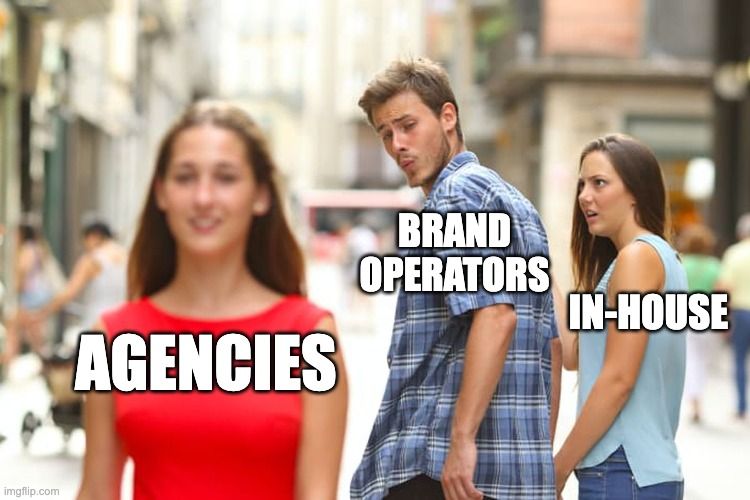This video is part of a new series I’m growing on my YouTube Channel (Make sure to subscribe!!) intended to display serious PPC thoughts, in an entertaining fashion. This video was based on a more in-depth article I wrote for Search Engine Land entitled: The Concerning Future of the Resilient Keyword. 👈 Check it out if you want to learn more after this video!
VIDEO TRANSCRIPT
Warning: The humor of the video is DEFINITELY lost reading the transcript, so basically it’s here for SEO value. Please don’t actually read the transcript… watch the video!
Hey I’m PPCKirk, and this is your Marketing MilliMoment. Not sure what a MilliMoment is? Check out my short Channel Promo video to learn more.
In this video, we’re going to take a second look at the keyword.
Might be a… third or 27th look… but whatever…
What is the keyword?
The keyword is an utterly remarkable marketing device.
I explain this in detail (profess my love, is more like it) in the first chapter in my book Ponderings of a PPC Professional. #ShamelessPluuuuug In this chapter I discuss the three aspects of the keyword that make it one of the most powerful marketing targeting methods of all time.
You’ve heard of GOAT. Well this is:
“OOTMPMTMOAT!!” ONE OF THE MOST POWERFUL MARKETING TARGETING METHODS OF ALL TIME. Let’s just agree to forget that ever happened…
Anyway, the three aspects of the keyword’s power are that it is:
- Personal
- Individual
- Timely
1) The keyword is Personal in that it is a person revealing to the advertiser the deep, dark secrets of their soul… not just simply a combination of various demographic data they have on you. “male, check, white, check, beard, check. “
2) The keyword is Individual, in that it is a single person telling you their deepest darkest secrets of their soul.
3) The keyword is Timely in that it is a person telling you their deepest darkest secrets… “what is with this guy and secrets”
… at the exact moment they are interested in getting an answer to their inquiry. You, the advertiser can connect with a single person, telling you exactly what they are interested in seeing, and at the very moment they are asking it you can show them an ad for a product or service that meets that need.
UNBELIEVABLE. Phenomenal!! Fantastic! Remarkable!
The keyword is truly: ONE OF THE MOST POWERFUL MARKETING TARGETING METHODS OF ALL TIME.
So, all that to say here is why I’ve lost trust in the Keyword.
*Brake screeching noise*
I know I know, I set you up a little, but that’s because I really want you to understand that I am a staunch keyword follower… believer… lover. As much as I love the keyword, I believe it has increased in weakness as the sole targeting method in our search campaigns, and we PPCers need to embrace this… as difficult as that may be.
I still think it should be the primary targeting method in our accounts, and Google’s algorithms, but there are some things that are changing I think we can’t ignore. Here’s what I mean, I believe user behavior, along with platform changes, have made the keyword less powerful than it used to be.
Let me put it like this. If a user types “nice shirt” into their browser… that’s not a whole lot to go on for an old school manual bidder like myself. Like what do I do with that.
Do you want to see pictures of actors in nice shirts? Are you hoping to buy stock in the new SAAS company “NiceSHURE-t” (this service does not exist)?
Do you want to buy a polo? Dress shirt? T-shirt? Vest? 3-Piece Suit? Hawaiian shirt? I got nothing, so I bid that term down (too generic!!) and throw a high-level “shirts” landing page on the ad, and move on.
But what about if the machine is in control? The machine has millions of data signals based on its knowledge of you, the searcher. Your recent browsing history. Your recent product views. Your interwebz behaviors.
It knows that Happy Gilmore searching for “nice shirt” wants a polo for his next 18 holes, and Elton John needs a dazzling sparkly color flared shirt for his next performance.
The machine knows what shirt to pair them with, where they are in the sales funnel, and therefore… how much to bid on that term at that moment.
*WHISTLES*
Point. The machine!
What’s changed? I’d posit a few things. And let me be clear, I’m sure there are other things to think about with this, but this is what I and some of my team members here at ZATO have discussed and pondered.
First, Google just has a better product than they used to, and users are aware of this. We’re becoming increasingly trained to type less, knowing we’ll still get better results. We’re lazy, why type in more if we don’t have to… if Google’s gonna just know… somehow what we want?! Why would I do more work?
Second, and along those lines, Google Autocomplete is increasingly brilliant as well. I can’t tell you when the last time was that I completely typed in my entire search into Google without using Autocomplete. Ironically, this may be why multiple word queries still persist so well in the top searched for terms!
If people start typing in:
“Suez…”
And Google completes it to:
“Suez canal blocked by huge container ship”
Then sure, that works for me… would I have typed in all of those words exactly like that otherwise? Probably not, but who cares. It got me where I needed to go.
WHISTLES
Point. Autocomplete!
Third, Let’s not forget about the impact of mobile. I don’t think I’m necessarily that old. But darned it if I don’t hate typing on my phone screen more than shoving lego pieces into the various orifices on my face. I hate IT. We type or speak differently than we did pre-phones and that’s going to work its way into keyword length (and in some ways, keyword intent).
That brings up an interesting point, by the way. The relationship between search term length and intent is nebulous, but not nonexistent. At some point, shorter terms (not short-tail, that’s different) will tend to reveal less intent to the human manual bidder than longer, multiple word terms.
All of those things before? Yeah, they hide intent in keywords more than they used to.
So yeah, the machines are taking over. Yeah Google is making some changes that are really stupid (like hiding search terms that could be used for broader business analysis unnecessarily, such as in Smart Shopping campaigns). But, hopefully I’ve convinced you that Search is also different than it was 10, even 5 years ago.
Users behave differently. It may very well be that leaning into shorter, more convoluted terms (keywords that don’t show you exactly what the intent is of the searcher) paired with Google’s audience and smart bidding, may be the very thing that saves your account. Whereas, 5 years ago we would have said avoid that like the plague.
Shrugs.
Times change, as Patrick Gilbert says “Time to join or die.” (Get his book here: “Join or Die PPC Book“)
I’m PPCKirk, and may the auctions be ever in your favor.


.webp)


.jpeg)

.jpg)




